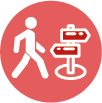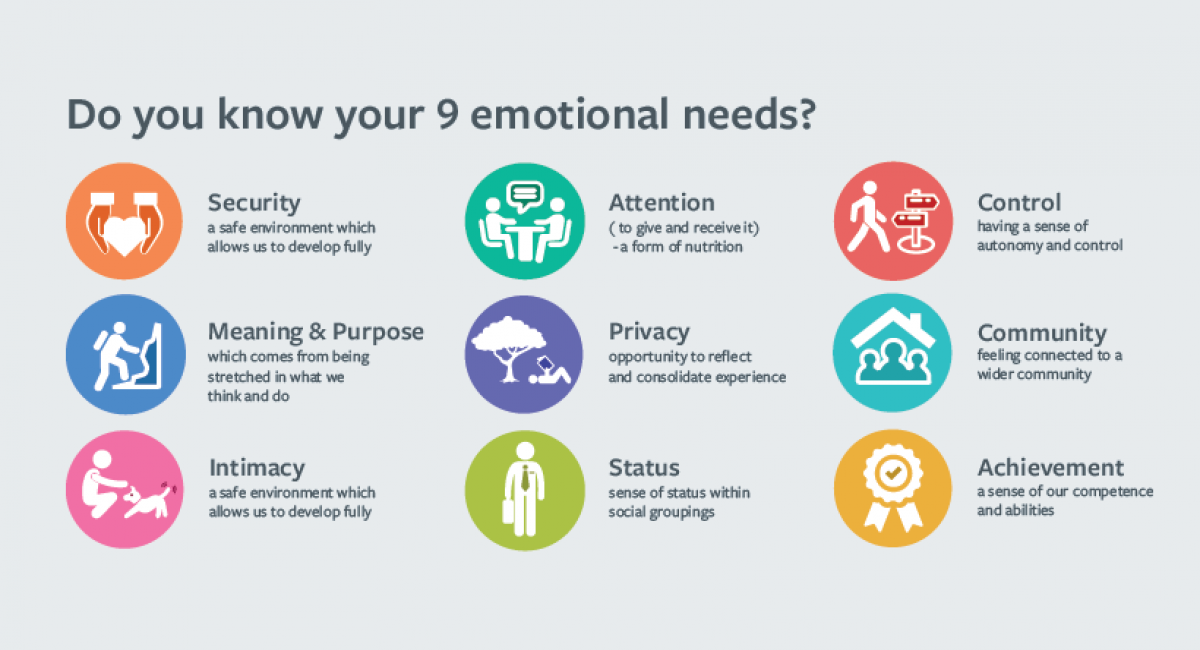Meeting emotional needs whilst socially isolating or working from home
Our mental and physical health depend upon meeting emotional needs in healthy ways. This keeps stress levels low and allows our immune system to fight back and work to promote recovery from illness.
Meeting emotional needs if we are socially isolated is challenging, and even more so if we are concerned about virus infection. What can we do to give ourselves the best chance of meeting needs to stay well? Let’s think through the emotional needs we are all familiar with.
Security & Control
Taking active steps to control risk of infection clearly supports us to meet emotional needs for security and control. However, given that the future is unpredictable – and even experts have limited information about the virus – we need to take steps to keep ourselves calm in uncertain circumstances. It is natural for our imaginations to seek to solve problems, but with limited information, this can lead to trying to fill in the gaps with unhelpful worrying.
- Remind yourself of the steps you are taking, keeping a list if it’s helpful. For example, washing your hands before and after and eating; cleaning
 your door handles regularly; and keeping surfaces clean
your door handles regularly; and keeping surfaces clean - Remind yourself as often as you need to that you have done all that you can with the information that you have
- If you are spending more time at home, create routines to give yourself structure, both if you are working from home, but if not, activities which you enjoy
- Spend some time remembering times when you have had to be cheerful and optimistic in the face of adversity
Community, Attention and Emotional Connection
How do we stay connected to the wider community and give ourselves opportunity to share attention and emotional connection?

- Contact people you know who may be self-isolating by phone, messaging apps or email. Ask them how they are and if they would like to talk either over the phone or with video calling
- Seek to set up groups with your friends so you canshare conversation and positive support. If there are activities you can be both be doing together perhaps share them over video calls
Privacy – time alone to calm down and reflect

It may seem that the need for privacy would be easy to meet while staying at home. However, if you live in a busy household with children and other relatives this could be difficult. An even bigger challenge to the need for privacy is the risk of spending too much time reading or watching coronavirus articles and videos online or on screens. What can do to meet the need for privacy at home?
- Agree a space with your family, which people can use to spend alone time free from distractions
- Limit online and screen time to specific times of the day
- Only visit sites which are reliable sources of expert government advice. Avoid media outlets and second-hand sources of information which sensationalise. Anything which drives up worry compromises the immune system
- Spend some time thinking about alternative activities which can keep you occupied – especially activities which you feel confident doing which give you a sense of being in control
Achievement and Meaning & Purpose

We meet our need for achievement through being stretched to learn and overcome challenges. Learning also contributes to meeting the need for meaning & purpose, along with the sense that we are needed by others and that we are contributed to a larger cause than ourselves. Meaning & purpose significantly contribute to resilience when we are faced with difficult situations. What steps can we take to meet these needs when we are self-isolating?
- If you are working from home, break the day up with rewarding goals which can be achieved in short spaces of time
- Time alone might provide you with opportunities to learn which have otherwise been hard to find. Are there activities, hobbies and interests you can spend time doing? Are there books you haven’t had a chance to read? Are there free online courses you can take?
- Are there people you can support over the phone or on video call to reduce the effects of isolation?
- Challenges which we share with others can give us a sense of being connected to a bigger cause than ourselves alone. By following agreed expert guidance and supporting each other through a difficult time, we can find a huge sense of shared meaning and purpose which supports our immune system and our mental health and wellbeing.
Bullet-point guide to the emotional needs

Security
Feeling like we have a place that is ours or where we belong. Safe territory that allows us to develop fully. Examples include:
- Waking up to news reports of company difficulties would be a challenge to feeling safe at work
- Domestic abuse would be an environmental challenge to need for security at home

Control
Having some autonomy and direction over our lives, being able to make choices. Examples include:
- Input into targets and objectives at work
- Being given a challenge and having the freedom to meet it in whatever way an individual or a team feel is right
- Toddler wanting to put their own shoes on, or feed themselves when weaning “I want to do it!”

Community
Making relationships with others, and being part of something bigger than ourselves. Examples include:
- Humans are tribal animals and need to feel part of a group – we’ve been organising ourselves into tribes for 350k years to keep ourselves safe from predators
- Teenagers WhatsApping in the middle of the night are doing so to make sure they’re not excluded from a conversation the next day

Respect/Status
Feeling valued by our peers, teachers, parents…feeling that we matter and our opinions count. Examples include:
- Getting real, concrete feedback from a line manager or employer
- Not feeling “fobbed off” or handed over to someone who can’t tackle your problem or answer your question

Privacy
Time to ourselves, away from clients, colleagues, even family, to reflect and consolidate experiences. Examples include:
- Some people car share, but after a few weeks, start making up excuses to not do it for a couple of days
- People going from a long commute to a short one sometimes need to get this need met in a different way when it changes

Emotional Connection
Having someone in our lives who accepts us warts and all – whether a parent, partner, pet. Examples include:
- Someone you can completely be yourself around
- The sort of person who will turn up at the side of the A14 in the middle of the night for you

Achievement
Being stretched or challenged, mastering something, feeling that you’re competent at a skill. Examples include:
- Stretched is no the same as being stressed – we need stretch in the workplace, people need to be challenged and feel they are developing
- Opportunities to try new things, different ways of working, taking on new learning

Meaning and Purpose
Feeling there’s a point to getting out of bed in the morning – whether looking after someone or something, volunteering, doing a job that makes a difference. Examples include:
- Seeing the link between your individual role/job and the meaning and purpose of the organisation as a whole
- E.g, janitor at NASA when JFK was visiting: “What’s your role here?”…”I’m helping to put a man on the moon.”

Attention
We need to give and receive attention – seeing it as a form of nutrition, in that we can have too much or too little. Examples include:
- Important to receive the right amount of attention from a line manager – not too much, so that you feel over-scrutinised, but not too little either, so that you feel ignored or under-valued
- Good example is kids – if they don’t get attention, they will knock something over because negative attention is better than no attention at all
- E.g office clown, Facebook status updates that are ambiguous and encourage people to ask how they are, etc
A big thank you to Suffolk Mind, who work from the human givens approach, for letting us reproduce this advice.
You may also find these helpful
- Coronavirus: How to reduce high anxiety now
- Coping with self-isolation
- RELAX mp3 – a useful tool
- Digital downloads to keep your mind occupied
- Online Courses – SAVE 20% – lifelong access
Posted 7th April 2020
Latest Tweets:
Tweets by humangivensLatest News:
HG practitioner participates in global congress
HG practitioner Felicity Jaffrey, who lives and works in Egypt, received the extraordinary honour of being invited to speak at Egypt’s hugely prestigious Global Congress on Population, Health and Human Development (PHDC24) in Cairo in October.
SCoPEd - latest update
The six SCoPEd partners have published their latest update on the important work currently underway with regards to the SCoPEd framework implementation, governance and impact assessment.
Date posted: 14/02/2024












